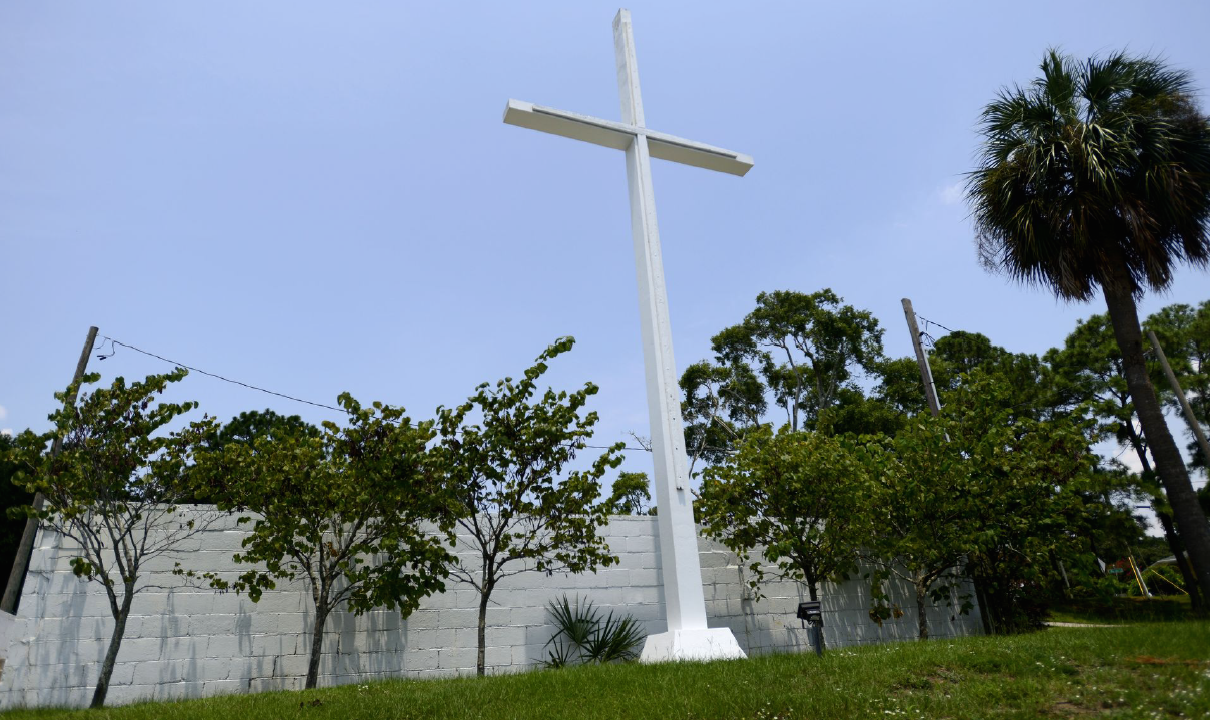 The U.S. Supreme Court today issued yet another blow to the principle of separation between state and church, vacating an appeals court decision against a massive Christian cross in a city-owned Pensacola park. That case is brought by the Freedom From Religion Foundation and the American Humanist Association.
The U.S. Supreme Court today issued yet another blow to the principle of separation between state and church, vacating an appeals court decision against a massive Christian cross in a city-owned Pensacola park. That case is brought by the Freedom From Religion Foundation and the American Humanist Association.
The action was considered almost inevitable after last week’s 7-2 decision by the high court approving a cross on government property in Bladensburg, Md. The U.S. 11th Circuit Court of Appeals, which had previously ruled the Pensacola cross unconstitutional, has been asked to reconsider its ruling in light of the Bladensburg case.
“We are more determined than ever to fight to keep religion out of government,” comments Annie Laurie Gaylor, FFRF co-president.
After FFRF and the AHA won at both the district level and before the 11th U.S. Circuit Court of Appeals, the city of Pensacola, Fla., asked the high court to review the decision. The case was in limbo pending the ruling in the Bladensburg case.
The Supreme Court has now vacated the 11th Circuit’s decision, and the appeals court has been instructed to reconsider its ruling. In the Bladensburg case, the U.S. Supreme Court shamefully decided that the government-owned, government-maintained, 40-foot-tall Christian cross dominating the landscape in Bladensburg, Md., did not violate the First Amendment.
The two groups filed their initial lawsuit against Pensacola on behalf of local residents in the U.S. District Court of Northern Florida in 2016. The case contended that the 34-foot-tall cross overwhelming Bayview Park and maintained by the city of Pensacola represents a clear preference for the Christian faith over other beliefs and nonbelief.
The district court sided with the national secular organizations in a June 2017 decision. In early fall of last year, the 11th Circuit upheld the decision, agreeing that the government-funded, freestanding cross unconstitutionally entangled the government with the Christian faith. The city petitioned the U.S. Supreme Court to issue a writ of certiorari urging the high court to overturn the ruling, and the two organizations presented their response brief in November .
Undeterred by the U.S. Supreme Court, FFRF and AHA will look forward to presenting their arguments once again before the 11th Circuit.
“A large cross displayed and maintained in a city park for worship services is unquestionably sectarian and confers endorsement of Christianity,” says FFRF Legal Director Rebecca S. Markert. “We’re hopeful that the court will see that even the Bladensburg decision doesn’t have an impact on this scenario.”
AHA concurs with this perspective.
“We remain confident in our legal position given the still firmly settled precedent finding religious displays maintained for exclusively religious purposes unconstitutional,” says Monica Miller, senior counsel for the American Humanist Association and counsel of record on the case. “The Bladensburg cross decision does not impact the decades of Supreme Court precedent holding government action motivated by a religious purpose unconstitutional.”
FFRF maintains that a city’s public spaces should be truly public.
“The nonreligious today number almost a quarter of the population, and should not be made to feel like outsiders in their own community,” says FFRF Co-President Annie Laurie Gaylor.
The AHA agrees.
“It is our long-held position that community parks should be just that: welcoming to every member of the community,” comments Roy Speckhardt, executive director at the American Humanist Association. “While we’re disappointed by the Supreme Court’s failure to affirm that, we are optimistic that the city of Pensacola will finally include all residents in its urban planning.”
Further details about the case can be accessed here.
The Freedom From Religion Foundation, based in Madison, Wis., is the nation’s largest association of freethinkers (atheists, agnostics), and has been working since 1978 to keep religion and government separate. With roughly 31,000 members and several chapters all over the country, including 1,500-plus members and a chapter in Florida, the organization also educates the public about nontheism.
The American Humanist Association (AHA) works to protect the rights of humanists, atheists, and other nontheistic Americans, including over 2,800 members in Florida. The AHA advances the ethical and life-affirming worldview of humanism, which — without beliefs in gods or other supernatural forces — encourages individuals to live informed and meaningful lives that aspire to the greater good of humanity. Special thanks to the Louis J. Appignani Foundation for their support of the Appignani Humanist Legal Center.

